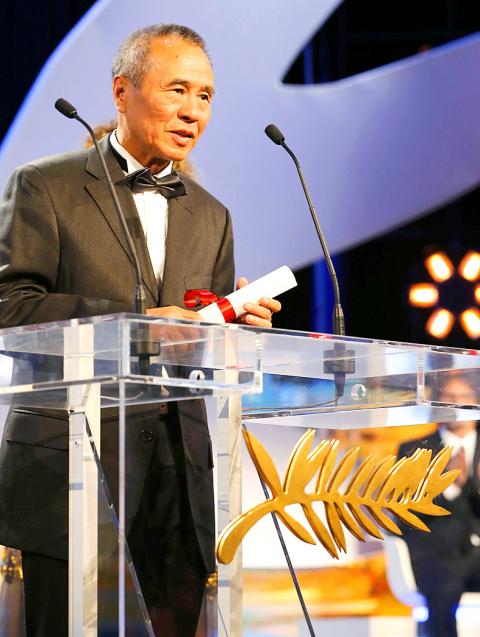Hou Hsiao-hsien (侯孝賢), who won the best director award at the Cannes Film Festival in France on Sunday with his first martial arts film, The Assassin (聶隱娘), said that his next project would be a movie about a river goddess set in the modern era.
Speaking at a seminar in Brussels on Wednesday, Hou said that Taipei used to have many waterways for paddy irrigation, but many of the waterways have since been covered over by roads as a result of urbanization.
If there were a river goddess, she would feel very sad about the situation, Hou said.

Photo: Reuters
Screenwriter Chu Tien-wen (朱天文) said Hou’s new project would be about a waterway enthusiast who encounters a river goddess while studying the city’s waterway system.
Actress Shu Qi (舒淇), the protagonist in The Assassin, would play the role of the river goddess, the 68-year-old director said.
The seminar was part of the “Taiwan Film Panorama” and “Hou Hsiao-hsien Retrospective” held by the Belgian Royal Cinematek.
The exhibition began with a screening of The Assassin on Wednesday, with about 260 people from political, economic, social and arts circles in Belgium and the EU attending.
Speaking to reporters, Hou said he is concerned that there are not many directors who are passionate about their craft, with enough conviction to make movies according to their own standards.
Hou said it is tough to be a director in Taiwan because of the pressure to create a box-office success while seeking a balance between one’s convictions and the views of movie companies and investors.
“These days in Taiwan, you can hardly find a director with the passion and conviction to simply insist that a movie be shot in a particular way or to say: ‘This is how I would like it to be,’” Hou said.
Hou is one of the few Taiwanese directors who are capable of finding funds abroad to support their film ideas.
Still, he has always tried to shoot artistic movies with minimal budgets, he said.
“I know a lot of movie directors would love to shoot grand movies with a big cast and big stars. I don’t find it necessary,” Hou said.
He said he prefers to use digital cameras and fresh faces as his key actors, which can be done on a smaller budget without the restraints imposed by investors.
To make emotional films, “the most fundamental thing is to have a strong impulse to do so,” Hou said. “You also need to have a special feeling about the environment in which you grew up.”
On the criticism that The Assassin is not an easy movie to understand because of the complexity of the main character, Hou said: “If you can understand it, just enjoy it; if you can’t, why not just appreciate it [as a work of art].”
“There are infinite types of films,” he said. “Just watch them in your own way. It’s OK to fall asleep in front of the big screen if you’re there just out of curiosity about the movie.”

EVA Airways today confirmed the death of a flight attendant on Saturday upon their return to Taiwan and said an internal investigation has been launched, as criticism mounted over a social media post accusing the airline of failing to offer sufficient employee protections. According to the post, the flight attendant complained of feeling sick on board a flight, but was unable to take sick leave or access medical care. The crew member allegedly did not receive assistance from the chief purser, who failed to heed their requests for medical attention or call an ambulance once the flight landed, the post said. As sick

A drunk woman was sexually assaulted inside a crowded concourse of Taipei Railway Station on Thursday last week before a foreign tourist notified police, leading to calls for better education on bystander intervention and review of security infrastructure. The man, surnamed Chiu (邱), was taken into custody on charges of sexual assault, taking advantage of the woman’s condition and public indecency. Police discovered that Chiu was a fugitive with prior convictions for vehicle theft. He has been taken into custody and is to complete his unserved six-month sentence, police said. On Thursday last week, Chiu was seen wearing a white

The Taichung District Court yesterday confirmed its final ruling that the marriage between teenage heir Lai (賴) and a man surnamed Hsia (夏) was legally invalid, preventing Hsia from inheriting Lai’s NT$500 million (US$16.37 million) estate. The court confirmed that Hsia chose not to appeal the civil judgement after the court handed down its ruling in June, making the decision final. In the June ruling, the court said that Lai, 18, and Hsia, 26, showed “no mutual admiration before the marriage” and that their interactions were “distant and unfamiliar.” The judge concluded that the couple lacked the “true intention of

EVA Airways, one of the leading international carriers in Taiwan, yesterday said that it was investigating reports that a cabin crew manager had ignored the condition of a sick flight attendant, who died on Saturday. The airline made the statement in response to a post circulating on social media that said that the flight attendant on an outbound flight was feeling sick and notified the cabin crew manager. Although the flight attendant grew increasingly ill on the return flight, the manager did not contact Medlink — a system that connects the aircraft to doctors on the ground for treatment advice during medical